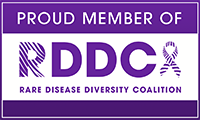![]()
Scleroderma Research Foundation
Frequently Asked Questions (FAQ)
Here are some of our Frequently Asked Questions. If you have a question for us, please send us a message.
What is scleroderma?
Scleroderma is an autoimmune disorder—a rheumatic disease that causes inflammation in the skin and other areas of the body. The name scleroderma literally means “hard skin” because the inflammation triggers the body’s own immune system to make too much collagen, leading to the hardening and tightening of the skin and connective tissues (ie: fibrosis). In the most serious cases, there can be complications resulting in damage to the heart, lungs, and digestive system.
Scleroderma is best thought of as a single disease. However, it is a complex disease that can progress in very variable ways in individual patients. Some are affected early with aggressive changes while others have milder symptoms. The disease might progress quickly or slowly. This makes a concise definition—and diagnosis—difficult.
Can the Scleroderma Research Foundation refer me to a doctor in my area?
The Scleroderma Research Foundation does not make referrals to doctors. We suggest you contact a local rheumatologist or one of the Centers of Excellence nearest you.
Can I donate stock to the Scleroderma Research Foundation?
Yes, the SRF accepts gifts of mutual funds, bonds, and stock securities. You can find the various ways to give here.
How can I make a tribute gift to the Scleroderma Research Foundation?
Tribute gifts can be made online, mailed to our address listed below in the footer, or you can talk to one of our staff members directly by calling 800-441-CURE ext 1
I lost my donation receipt from the Scleroderma Research Foundation. Who do I contact for a replacement?
For questions regarding your gift, please contact us at info@srfcure.org or call 800-411-CURE.
How can I know my donation to the Scleroderma Research Foundation will be used responsibly?
At the Scleroderma Research Foundation, we take seriously our responsibility to the scleroderma community and work hard to maximize every dollar invested in our work. That commitment earned us a 4-Star rating from Charity Navigator and a Platinum rating on Guidestar, the highest ranking possible for financial accountability and transparency from two of America’s largest independent charity evaluators. To-date, the SRF has raised more than $40 million dollars to drive scleroderma medical research forward, so that—one day—no one will suffer from scleroderma. We recognize the value of support groups and advocacy, but ultimately, medical research holds the key to saving lives. Quite simply, the SRF provides more resources to talented scleroderma investigators than any other like-minded nonprofit organization in the country. Research is at the center of everything we do, and as we forge ahead with this laser focus, we remain committed stewards of the financial resources you entrust to us.
Read more about how the SRF maximizes every dollar that is invested in the Annual Report.
How does the Scleroderma Research Foundation decide where research dollars will be spent?
One of the principal benefits offered to the SRF supporters to ensure their gifts yield maximum results is our Scientific Advisory Board. The SRF goes beyond peer-reviewed research to drive research forward. This extraordinary team of scientific advisors are among the most talented and influential scientists in the world – not just in terms of scleroderma research – but medical research overall. Our advisors help to guide funding decisions throughout the year, culminating in an annual Science Workshop that brings together funded researchers, outside experts and new applicants. They bring a level of analysis to this meeting that ensures (1) only the most promising studies receive funding from institutions – far and wide; and (2) that the SRF funded researchers have access to other investigators so they can collaborate for the benefit of scleroderma patients. SRF funded researchers do not work alone. They collaborate with our advisors as well as others around the world to share data and results.
Is the Scleroderma Research Foundation a 501(c)3 non profit organization?
Yes, Scleroderma Research Foundation is a 501(c)3 nonprofit (TAX ID #68-0087234). All gifts made to the SRF are fully deductible to the extent allowed by law. You can go here for more information, email us at info@srfcure.org, or give us a call at 800.441.CURE (2873) if you have any questions.

